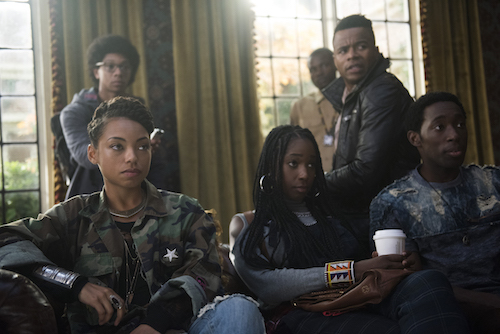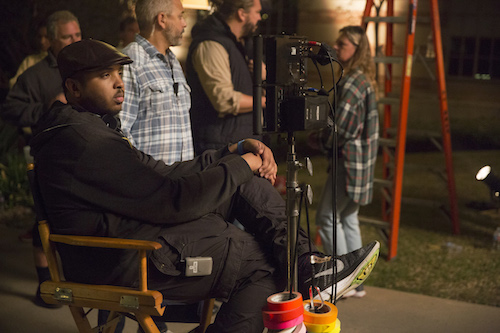Justin Simien burst into Hollywood with 2014’s Dear White People, a satire showcasing a diverse group of students facing cultural bias, social injustice and identity politics at a mostly white Ivy League college.
Three years later he’s continuing that conversation and going further with Netflix’s critically acclaimed TV adaptation of the same name.
In advance of this year’s PromaxBDA Conference at LA Live from June 5-8, where Simien will be a keynote speaker, Daily Brief sat down to talk to the writer-director-executive producer about why Netflix appealed to him and how working in publicity shaped his career.
Daily Brief: What brought you back for more Dear White People?
Simien: I had so many plotlines and characters I had developed over the years before the script was ready to shoot and they were still talking in my head. When we went on tour with the film to different colleges and to different countries, talking to audiences about it, I had even more insight on the subject matter. I was buzzing with stories and already thinking, if there was a way to do this as a show, how would I do it?
The television department at Lionsgate, who did the home video distribution for the film, reached out and asked me what would I do if it was a TV show? I happened to be very clear about that. We immediately went around town and got a number of great networks interested and ultimately went with Netflix because I wanted to do something new with the storytelling. I wanted to make something for the binge generation. That’s how I watch TV shows and I thought, what can I do that I can only do on Netflix? I have a five-hour canvas and can dig even deeper into these character’s lives and what makes them tick.

How hard was it to go about recasting most of the characters?
Everything unexpected has to be an exciting challenge, otherwise you’ll go a little crazy in this industry. It became clear early on that there would be a number of conflicts bringing the original cast back, which was always my hope. But that’s not the way it worked out.
When it came time to replace certain members of the cast, I looked for somebody who understood the characters I created, and brought something unexpected. That helped because these people are filling the shoes of other actors and the last thing I wanted was for you to see the show and think, oh that’s an imitation of what Tessa Thompson did. I want them to feel like those same characters, but with new life. It was hard to adjust to at first, but I viewed it as an exciting opportunity to bring something new to the concept.
As you say in the show, pop culture shows people what they can and can’t be. What characters or identities are you most proud of exploring?
All of them. That’s a lame answer, but I don’t see each one of the main characters in any other show. I don’t see these stories being told on other shows. What I love so much about this moment in time for television is you can have a number of shows that feature black characters all around the same age and yet all have totally different things to say.
I do think a character like Lionel has the potential to change lives. As a gay black kid growing up in the south, I didn’t have a Lionel in the culture to let me know that what I was was okay and that I could be myself and be unapologetic about it. You look around for role models to see yourself and you kind of assume you don’t belong. I’m especially proud of Lionel for that reason.
It’s really important for not only women of color, but also people of color that are trans, gay, bisexual, those stories need to get out there too, because again, it adds to our humanity and allows so many of us to feel seen.
There’s a running joke in the show about hate-watching Defamation, clearly a Scandal-like show. What are your thoughts on “hate watching”? Do you watch Scandal?
I haven’t watched Scandal in years but I watched it regularly when it first started. The Scandal viewing party, it’s a thing…I don’t know if other people do it as well, but we get together and we watch these things because there are so few of them.
Hate-watching is an extrapolation of that because there are so few things for people of color to watch, a lot of the time we do end up hate-watching things that we don’t particularly like or want to see, but feel an obligation to see them. I can’t say that I hate-watch Scandal, but there are certainly “black” pieces of entertainment that I’m not looking forward to seeing but somehow bring myself to, just to support. That was a wink to parts of our experience that don’t typically make it into pop culture.
I have a few friends who went to Chapman, where you went to film school, and they’re not surprised at all Winchester is based on it.
You know, it is Chapman but it isn’t. It’s a stand-in for America, a microcosm. We push everything to an extreme that I didn’t necessarily experience at Chapman. But what I did experience was the utter culture shock of arriving in a place where people had literally not met black people before. I grew up in Houston, in the city, I went to a performing arts high school. I was constantly surrounded by people that looked like me and didn’t look like me, and we were all… humans and didn’t fall into these silly traps.
In Orange County, I was having to explain to people, no, I get that I’m black and tall, but I can’t play basketball. Just those ABC conversations between people who have seen black people on TV but didn’t have any in their lives was shocking.
I find your postgraduate work an interesting glimpse into the film and TV landscape: working as a social media manager and in publicity. How did that prepare you for making Dear White People?

I’ll probably always tell stories that have some kind of barrier to being made because I’m attracted to work that’s challenging, provocative, and will be more and more polarizing. Learning how to create the story around the story was something I got from that experience that is just so invaluable.
Nobody can sell your work better than you can, especially the kind of work that I want to do my whole career. Some of these things are going to be a tough sell. When everyone else is scratching their head wondering how to promote things to future black people, I want to already have some insight.
It was an intentional thing to go into publicity, at least as an intern. I don’t think I realized it would be an eight-year career. My senior year in college, the internship that led to my first job was at Focus [Features], and getting to see how they made Brokeback Mountain into a mainstream hit, that was some pretty good learning, I’ve gotta say. I don’t think I would’ve done quite as well with the concept trailer, which ultimately led to the film being financed, if I hadn’t had that experience.
I also learned how to talk to press. I learned how to package the message into easily understood soundbites. You can’t help but pick up on that stuff when you’re around it. For some directors, dealing with publicity and marketing can feel foreign, because it’s not a job we do. But it really made my career happen. It’s the foundation.
In terms of trying to be more polarizing, are you talking about Dear White People season two or other projects on the horizon?
I’m talking in general. I talk about my parthenon, the directors whose careers I envy and want to have, and they all have moments in their careers where people just don’t get their work the time it comes out. It takes people time to see what they did.
I’m attracted to work that feels dangerous in some way because the stories that matter are the ones that break us out of whatever illusions we still hold. Because I am coming from a black point of view, no one knows how to market our stuff yet.
All the hubbub over the title Dear White People, that’s nothing in my opinion compared to the things my heroes did in their careers. If I want to do anything like that I got to be willing to be thrown into the fire and have the ability to communicate what I’m doing. Especially in this age when everything is “triggering” and it feels like there isn’t room anymore for people to ponder thoughtfully. Everyone has a knee-jerk reaction. Figuring out how to communicate a story before people see the story—it’s never been more important than right now.
Justin Simien will be in person to communicate many stories as the keynote speaker for this year’s PromaxBDA conference, which you can register for now. Dear White People is now streaming on Netflix.
[All images courtesy of Netflix]
Tags:













































__twocolumncontent.jpg)











